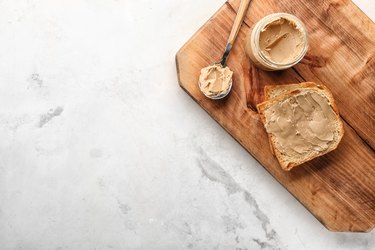
Regardless of whether you prefer creamy or crunchy, eating peanut butter can support your weight-loss efforts. This calorically dense spread may seem like a diet buster, but it has satiating qualities that may inhibit weight gain.
You can even follow a "peanut butter" diet that promotes weight loss and better health, while still enjoying peanut butter every day and keep track using an online calorie counter.
Video of the Day
Video of the Day
Of course, too much of any food will cause you to gain weight, so moderate your portion sizes. You'll be missing out on taste and satisfaction if you leave peanut butter out of your weight-loss plan, though. Consult a dietitian for help designing a weight-loss plan appropriate for you.
Tip
When peanut butter is part of a healthy, balanced reduced-calorie diet, it can support your weight-loss efforts by keeping your hunger at bay.
Concerns About Peanut Butter
Usually, weight loss requires you to exercise more and eat fewer calories. This creates a calorie deficit that forces your body to burn body weight for energy. In the process of eating less, higher calorie foods are usually avoided.
Peanut butter, with almost 200 calories per 2-tablespoon serving and 16 grams of fat — mostly unsaturated — seems like it would fall into this category. Peanut butter is often paired with not-so-diet-friendly foods, such as white bread and jelly on a sandwich, or chocolate chips or butter in cookies.
If you include peanut butter as part of a low-calorie plan and if you budget for the calories it provides, you can include it in a weight-loss diet. Peanut butter falls into the category of nutrient-dense foods — meaning that it supplies a wealth of nutrients in all its calories.
A paper published in Nutrients in December 2017 noted that consumption of nuts — including peanuts — correlates with reduced incidences of coronary heart disease and gallstones, as well as with reduced incidences of diabetes in women. Peanut butter is inherently good for you, and is good for a diet.
Research Confirms Weight-Control Benefits
Budgeting some calories for peanut butter is especially helpful when you've cut back on your calorie intake. Peanuts can help you stave off the hunger that's often associated with dieting. According to an October 2018 prospective study published in the European Journal of Nutrition, people who include more nuts in their diet are less likely to have overweight or obesity, a reduced risk of weight gain.
When you add nuts to your diet, your appetite naturally diminishes and you compensate for the extra calories by eating less.
A later study, presented in the August 2010 issue of the British Journal of Nutrition, had more than 100 participants consume 56 grams of peanut products — equal to about 3 tablespoons of peanut butter — daily for four weeks. The researchers found that the addition of peanut butter to the participants' diets did not result in weight gain and helped improve their cholesterol levels.
As long as you make the calories in peanut butter part of your low-calorie plan, it won't inherently cause weight gain. A 2013 study in Nutrition Research found that middle-school-aged children, who reported regularly consuming peanuts — including peanut butter — were less likely to have overweight or obesity than those who did not regularly consume peanuts or peanut butter.
Children who eat peanut butter or peanuts also report eating a higher quality diet and exhibited better lipid, or cholesterol, levels.
Read more: Is Eating Peanut Butter Good for You?
Peanut Butter and Weight Loss
No food magically causes you to lose weight, so don't start adding tablespoons of peanut butter to your current meal plan, and expect to drop pounds. If you don't change your other dietary habits by reducing your portion sizes and choosing lean proteins, whole grains and fresh vegetables, you might even gain pounds. Instead, use peanut butter as an alternative to foods that are less nutritious.
The spread provides you with unsaturated fats, protein, magnesium, vitamin E and the B-vitamin, niacin. Just one-half of a serving listed on the jar — 1 tablespoon at 100 calories — counts as one ounce of protein, according to the USDA.
Instead of butter, spread a tablespoon of peanut butter on whole-grain toast or stir a tablespoon of peanut butter into hot cereal instead of adding brown sugar. For a snack, spread peanut butter on celery sticks or on an apple, in lieu of having a processed cereal bar.
Add a spoonful of peanut butter to a smoothie made with banana, milk and protein powder as a meal replacement. Instead of reaching for a cookie or a chocolate bar, enjoy a tablespoon of peanut butter.
Read more: 7 Healthy Peanut Butter Brands
Selecting Peanut Butter
Choose the healthiest peanut butters by avoiding those that contain added sugar and hydrogenated oils. Choose peanut butters that only have peanuts listed on the list of ingredients. If you avoid brands whose labels state "with salt," you'll help keep your sodium intake in check.
You might be trying to lose weight, but that doesn't mean you have to avoid all fat. Low-fat or reduced-fat peanut butters often taste inferior, and simply have more sugar or starch added to make up for the fat. Go for the real thing to get the full nutritional value, and peanut butter's satiating benefits.
- USDA: "All About the Protein Foods Group"
- Nutrients: "Nuts and Human Health Outcomes: A Systematic Review"
- USDA FoodData Central: "Peanut Butter, Creamy"
- British Journal of Nutrition: "Effects of Peanut Processing on Body Weight and Fasting Plasma Lipids"
- Nutrition Research: "Peanut Consumption in Adolescents Is Associated With Improved Weight Status"
- European Journal of Nutrition: "Nut Intake and 5-year Changes in Body Weight and Obesity Risk in Adults: Results From the EPIC-Panacea Study"
- ABC News: Can You Slim Down on Peanut Butter Diet?